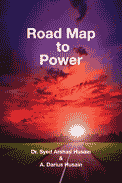
 |
While the title may lead one to think this is a self-help book, this writing goes beyond that type of genre with its intellectual focus on gaining healthy power. In the writings about the ten rules of power, the first chapter examines how most of us are average (based on the Bell Curve), then takes us through a relationship with a co-worker who inspires him to change, and focuses on the Pareto Distribution of wealth. This chapter is a thoughtful introduction to the rest of the book. Other chapters include a history of power, the legend of equality, and the Great Society. Also discussed is our self focus, what we learn from the media about ourselves, and the lessons he's learned from working as a child psychiatrist with children in war-torn countries and areas of poverty. Final chapters explore writing your own narrative, religion, spirituality, and the road map to power by becoming a humanitarian.
Each chapter begins with Mile Markers, which list the major topics to be discussed and then ends with Power Points to summarize the readings; both of these techniques are helpful to the reader. While the book is based on his own observations and scientific studies, there is an historical component to his teachings as well as insights into his own life in the form of autobiographical content. His knowledge gained from the relationship with his co-worker are eye opening to him and may be eye-opening to readers as well. He manages to write about himself within the focus of gaining power without it being a narcissistic treatise. Exploring the fact that most of us will not be the 1% of the elite, he expertly covers what is authentic power, how to construct our own narratives, and how to become humanitarians instead of self-absorbed, power-hungry, and materialistic shells of ourselves. It is wonderfully written in both content and style.
RECOMMENDED by the US Review